For many people, a life without cheese is simply unimaginable. I’m personally not one of those people. I can take it or leave it. But I know that there are many people out there that LOVE cheese.And if you happen to love cheese and have kidney disease, you might be wondering how you can continue to eat cheese when you have kidney disease?
This post may contain affiliate links through which we may earn a small commission to help keep this website free.
Skip the ads: Kidney Foodie Academy members can access ALL of the Kidney Foodie Grocery Shopping Guides ad-free by visiting this section of the library. Not a member? Learn more about Kidney Foodie Academy here.
Table of contents
- Is cheese bad for kidneys?
- Is cheese okay if I have CKD and Diabetes?
- How can I find kidney friendly cheese?
- Types of cheese
- Is cream cheese good for kidney disease?
- Is ricotta cheese okay for kidney disease?
- Is Goat Cheese Good for kidney disease?
- Is Feta Cheese good for kidney disease?
- Is Cheddar Cheese good for kidney disease?
- Is Swiss Cheese cheese good for kidney disease?
- Is Parmesan Cheese good for kidney disease?
- Is Mozzarella Cheese ok for kidney disease?
- Is Cotija Cheese good for kidney disease?
- Is Blue Cheese good for kidney disease?
- Is Brie Cheese good for kidney disease?
Is cheese bad for kidneys?
Yes, cheese can be problematic for people with kidney disease. However, the kind of cheese that you choose can make a big difference in how kidney friendly it is.
Cheese and Protein
Cheese is considered a high protein food. If you have CKD and are not on dialysis, then you may have been instructed by your healthcare provider to follow a lower protein diet. Now, that’s not to say that you can never eat cheese again, but you do need to be a bit more careful with your portions as well as what else you eat in a day to make sure you aren’t getting too much protein. If you’ve already taken my course, you know that one of my meals plans had two servings of cheese in it, so including cheese in the CKD diet can definitely be done!
If you are on dialysis, then you probably have higher protein requirements and the protein content of cheese is not a concern. Keep reading to learn about other nutrients to be mindful of.
Lastly, you may want to consider the source of your protein if you have kidney disease. Protein from animal sources, including cheese, produce more acid in your body and contribute to metabolic acidosis. Making swaps to choose plant based protein options can help improve metabolic acidosis.
Low Phosphorus Cheese
If you want to enjoy cheese on a kidney diet, it is important to choose a low phosphorus cheese. Many cheese products contain phosphorus additives. Phosphorus helps cheese melt better and have a creamier texture. If we look at the ingredient list of American cheese, we can see that it contains 2 phosphorus additives:

Although phosphorus content is not listed on the label itself, we do actually have good data on phosphorus content of American cheese, thanks to the USDA. American cheese can have over 200mg of phosphorus per slice. That is 20% of your daily phosphorus limit in a tiny piece of cheese! When shopping for a cheese to include in the CKD diet, look for one with no added phosphates.
Low Sodium Cheese
The majority of cheeses have a ton of salt added to them. When looking for kidney friendly foods, we ideally aim for foods that have fewer milligrams of sodium than calories. Take a look at the nutrition label for some American cheese below.
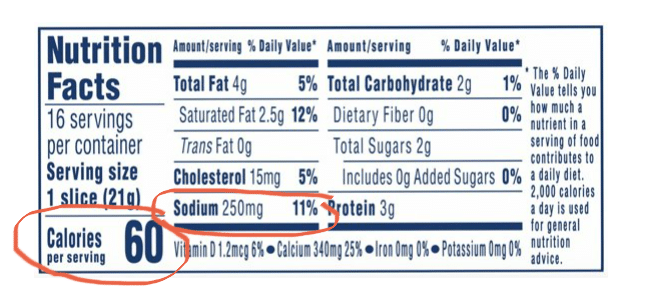
Each slice of cheese has 240mg of sodium, but only 60 calories. That is 4x as much sodium as calories. This is really high!
The majority of cheeses will be high in sodium. Swiss cheese is naturally low in sodium, so it is a good option for anyone looking for a lower sodium cheese. Some cheeses come in low sodium versions as well. Another option for including cheese into a kidney friendly diet is to pair cheese with other low sodium foods. It is possible to include a high sodium cheese in recipes and have the overall dish end up low in sodium – we do it all the time in our recipes!
Is cheese high in potassium?
Almost all cheese are considered low potassium foods. Most of the potassium in dairy products is in the whey part of the milk. When making cheese, you separate the whey and the curds. Most of the potassium remains in the whey, with only a small amount of potassium remaining in the curds that are then used to make cheese.
The one notable exception to that is gjetost cheese, which is very high in potassium. One ounce of gjetost contains 400mg of potassium. Gjetost is made with the whey portion of milk, hence the very high potassium content.
What about the calcium in the cheese?
If you’ve found a low sodium, no phosphorus additive cheese that you like, do you need to be concerned about the calcium? Maybe.
If you have high calcium labs levels, then you need to keep an eye on how much calcium you consume. My first recommendation would be to gather up all of your medications and any supplements that you take, and ask your dietitian or doctor if they could be causing your high calcium levels. More often than not, you’re probably taking something that has a lot of calcium in it. If it is a medication, they may be able to switch you to something that has no calcium in it. If it is a supplement, they may recommend that you stop taking it. If there are no medications or supplements causing your high calcium levels, then you may need to look at what you’re eating. One or two servings of low sodium, no phosphorus additive cheese per day is probably fine. If you are eating a lot of dairy foods, then you may need to cut back. There may also be other foods that you are eating that are causing the high calcium levels. For example, many cereals and milk substitutes contain a lot of calcium.
If your calcium levels are low or within range, then you only need to focus on the sodium and phosphorus content of your cheese. You can probably consume 3 servings of cheese per day and keep your calcium levels in range.
Is cheese okay if I have CKD and Diabetes?
Cheese is typically low in carbohydrates and higher in fat, which mean that cheese can be safely included in your eating plan if you have CKD and diabetes. You would just need to focus on the same things that people who don’t have diabetes need to keep in mind, which is the protein, phosphorus, and sodium content of cheese.
How can I find kidney friendly cheese?
- Read the food label – You want to find a cheese with no phosphorus additives.
- Avoid “Singles” and American cheese – I really try not to tell people to avoid specific foods, but cheese “singles” and American cheese are just so terrible for you. And I’m not just talking about people with kidney disease. I really think that everyone should avoid these! These are the worst type of cheeses you can eat. They are always loaded with phosphorus and sodium. There are much better alternatives for sliced cheese.
- Avoid reduced fat or fat free cheese – In my experience, these will tend to be higher in sodium and phosphorus additives as well as have a higher % of protein. Not to mention, they just don’t taste as good as real cheese!
- Offset the sodium with lower sodium choices in your day – it will be hard to find a low sodium cheese. There are a few, but most cheeses are going to be considered high sodium foods. If you’re following the strategies in my course, you will most likely have some “extra” salt in your day that you can spend on high sodium foods like cheese!
- Be sure the protein fits into your daily goals – since most cheeses are higher in protein, you’ll typically only be able to squeeze one (maybe two!) servings into your day with careful planning.
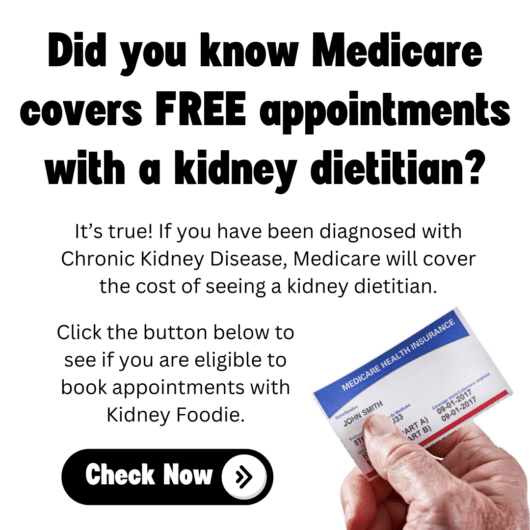
Types of cheese
Is cream cheese good for kidney disease?
Yes, cream cheese can be a good option for people with kidney disease.
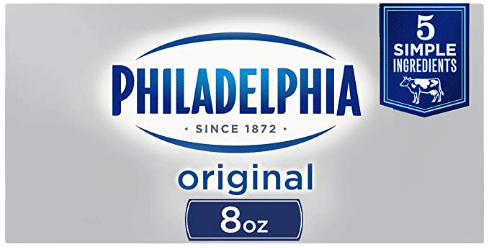
- Calories: 99
- Protein: 2g
- Carbohydrate: 2g
- Fat: 10g
- Sodium: 89mg
- Potassium: 37mg
- Calcium: 28mg
- Fiber: 0g
Is cream cheese high in protein?
No, cream cheese is considered a lower protein cheese. One ounce of cream cheese contains approximately 2g of protein. Of all of the cheeses, full fat cream cheese comes in at the lowest in protein at only 8% protein.
Is cream cheese high in phosphorus?
Many cream cheese contain phosphorus additives. Check the ingredient lists to see if any ingredients contain the letters “PHOS”, and select a cream cheese that does not contain phosphorus additives. We recommend avoiding fat free or reduced fat cream cheeses, and have found that these are more likely to contain phosphorus additives.
Does cream cheese have potassium?
Yes, cream cheese contains approximately 37mg of potassium per serving, making it a low potassium food.
Is ricotta cheese okay for kidney disease?
Yes, ricotta cheese can be a good option for people with kidney disease. One quarter cup of whole milk ricotta contains:

- Calories: 93
- Protein: 5g
- Carbohydrate: 5g
- Fat: 6g
- Sodium: 136mg
- Potassium: 136mg
- Calcium: 128mg
- Fiber: 0g
Is ricotta cheese high in protein?
Whole Milk Ricotta is 20% protein with 5g of protein per 100 calorie serving, so you would need to be pairing this with foods that are very low in protein (such as fruit) to offset the relatively high amount of protein in this cheese. If you’re going to use ricotta cheese, always buy the whole milk version and check for phosphorus additives. This Happy Belly Ricotta has only 70mg of sodium, so while it is high in protein, at least it isn’t high in sodium too!
Is ricotta cheese high in potassium?
Ricotta cheese is higher in potassium than most cheeses because it is made from whole milk (instead of just the curds). However, a quarter cup of ricotta cheese only contains about 136mg of potassium, so it is still a relatively low potassium cheese.
Is ricotta cheese high in phosphorus?
Ricotta cheese does not typically contain phosphorus additives. One quarter cup of ricotta cheese will contain approximately 95mg of phosphorus, and the bioavailability of animal based phosphorus is about 60-70%.
Is Goat Cheese Good for kidney disease?
Yes, goat cheese can be a good option for people with kidney disease. One ounce of soft type goat cheese contains:

- Calories: 75
- Protein: 5g
- Carbohydrate: 0g
- Fat: 6g
- Sodium: 130mg
- Potassium: 7mg
- Calcium: 40mg
- Fiber: 0g
Is goat cheese high in protein?
Goat cheese comes in at 20% protein with 4g of protein per 80 calories. This goat cheese from Whole Foods is also considered a low sodium food with 80mg of sodium per serving.
Is Feta Cheese good for kidney disease?
Feta cheese is typically very high in sodium, which is not good for a kidney friendly diet. Feta cheese can still be included in a kidney friendly diet if you limit the portion size and choose some lower sodium foods in other parts of the day or meal to offset the higher sodium. A good example of this is with our Low Sodium Greek Salad. A typical one ounce serving of feta cheese contains:
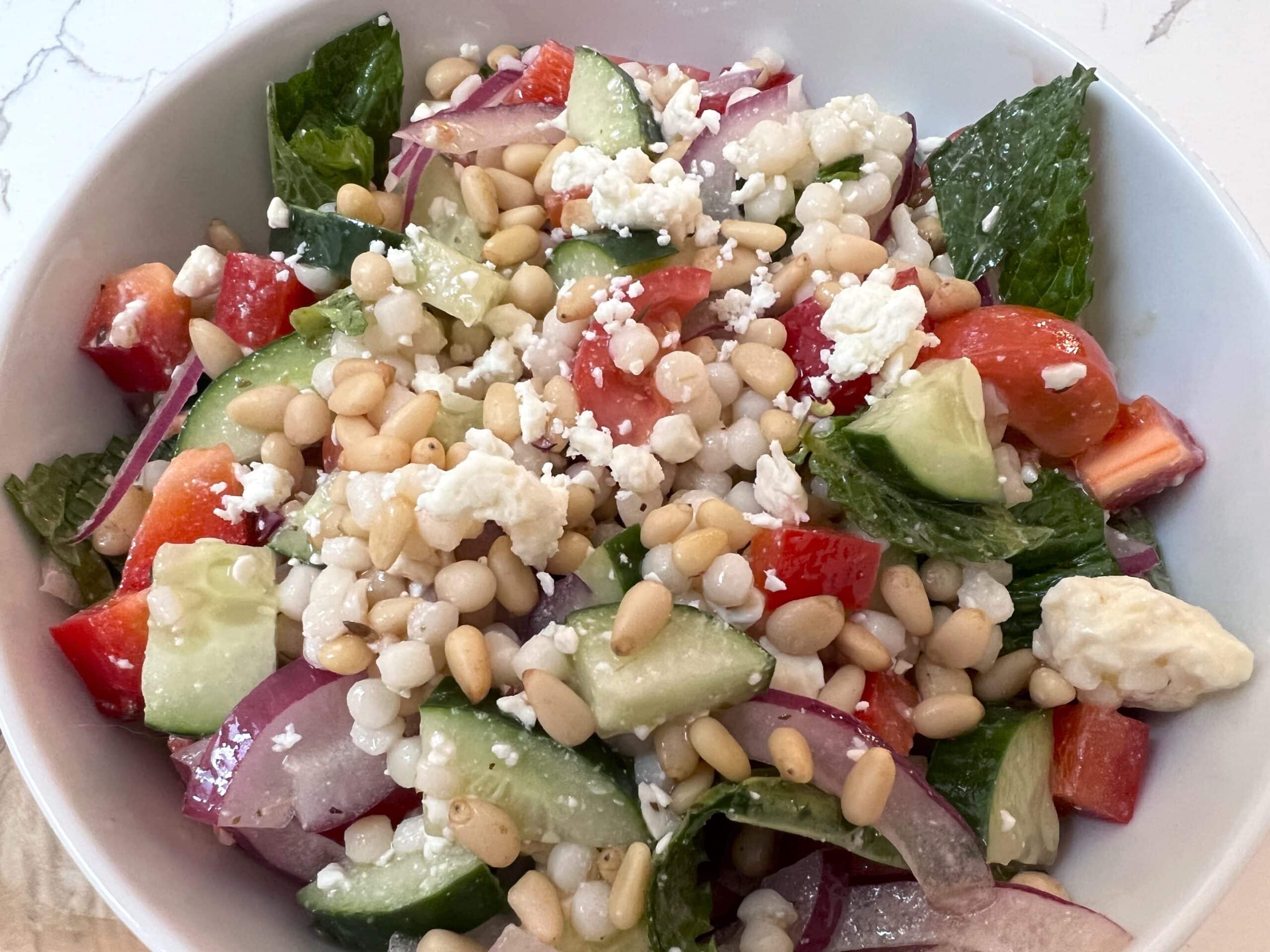
- Calories: 75
- Protein: 4g
- Carbohydrate: 1g
- Fat: 6g
- Sodium: 323mg
- Phosphorus
Additives: None - Potassium: 18mg
- Calcium: 140mg
- Fiber: 0g
Is feta cheese high in protein?
Feta cheese comes in at a little over 21.4% protein – so this would be a high protein food for someone with Chronic Kidney Disease, but still something that we can work into daily meals if that’s something you want to do. Most feta cheeses will also be high in sodium, so be sure you are offsetting both the protein and sodium with foods that are lower in protein and sodium.
Is feta cheese high in potassium?
No, feta cheese is considered a low potassium food. One ounce contains approximately 18mg of potassium.
Is feta cheese high in phosphorus?
Most feta cheese do not contain phosphorus additives, which is a good thing. One ounce of feta will contain approximately 96mg of phosphorus, and phosphorus from animal based foods is only about 60-70% absorbable.
Is Cheddar Cheese good for kidney disease?
Cheddar cheese is typically high in sodium, which is not good for a kidney friendly diet. Cheddar cheese can still be included in a kidney friendly diet if you limit the portion size and choose some lower sodium foods in other parts of the day or meal to offset the higher sodium. You may even be able to find low sodium cheddar cheese. A one ounce portion of cheddar cheese contains:
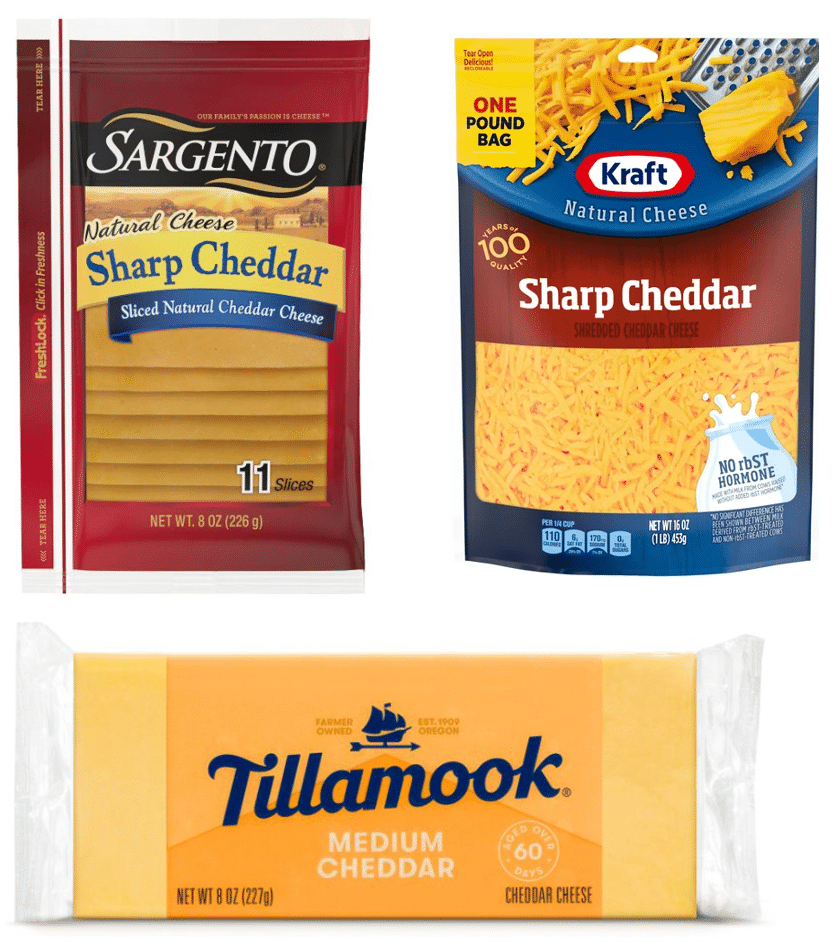
- Calories: 115
- Protein: 7g
- Carbohydrate: 1g
- Fat: 9g
- Sodium: 180mg
- Potassium: 21mg
- Calcium: 199mg
- Fiber: 0g
Is cheddar cheese high in protein?
Yes, Cheddar cheese is approximately 23% protein and contains about 7g of protein per ounce.
Is cheddar cheese high in potassium?
No, cheddar cheese is considered low in potassium. One ounce contains approximately 21mg of potassium.
Is cheddar cheese high in phosphorus?
Real cheddar cheese does not typically contain phosphorus additives. Be careful with “singles” cheese products as these are typically very high in phosphorus. A one ounce serving of real cheddar cheese contains 129mg of phosphorus, and phosphorus from animal sources is only about 60-70% absorbable.
Is Swiss Cheese cheese good for kidney disease?
Yes, swiss cheese can be a good option for people with kidney disease. It is one of the lowest sodium cheeses. Swiss cheese is naturally low in sodium, so any brand that you choose to buy will probably be considered a low sodium food (just avoid the swiss “singles” that are wrapped like American cheese – these will be higher in sodium and contain phosphorus additives). One ounce of swiss cheese contains:
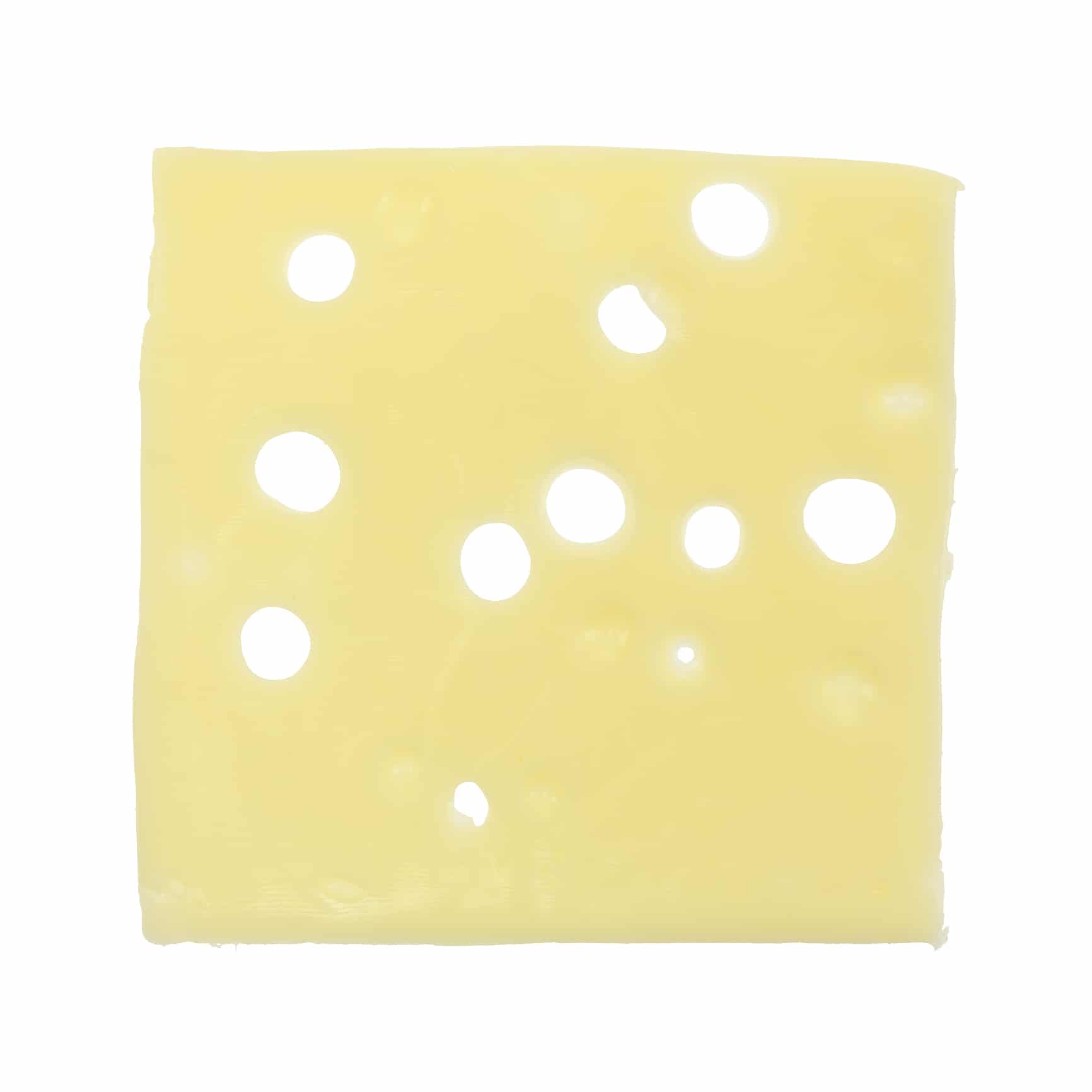
- Calories: 111
- Protein: 8g
- Carbohydrate: 0.4g
- Fat: 9g
- Sodium: 53mg
- Phosphorus
Additives: None - Potassium: 20mg
- Calcium: 252mg
- Fiber: 0g
Is swiss cheese high in protein?
Yes, swiss cheese is considered a high protein food. Swiss cheese is a little over 27% protein and contains approximately 8 grams of protein per ounce.
Is swiss cheese high in potassium?
No, swiss cheese is not considered a high potassium food. Once ounce contains approximately 20mg of potassium.
Is swiss cheese high in phosphorus?
Real swiss cheese does not typically contain phosphorus additives. Be careful with “singles” cheese products as these are typically very high in phosphorus. A one ounce serving of real swiss cheese contains 163mg of phosphorus, and phosphorus from animal sources is only about 60-70% absorbable.
Is Parmesan Cheese good for kidney disease?
Parmesan cheese is typically very high in sodium, which is not good for people with kidney disease. Parmesan cheese can still be included in a kidney friendly diet if you limit the portion size and choose some lower sodium foods in other parts of the day or meal to offset the higher sodium. You may even be able to find low sodium parmesan cheese. A one ounce portion of parmesan cheese contains:
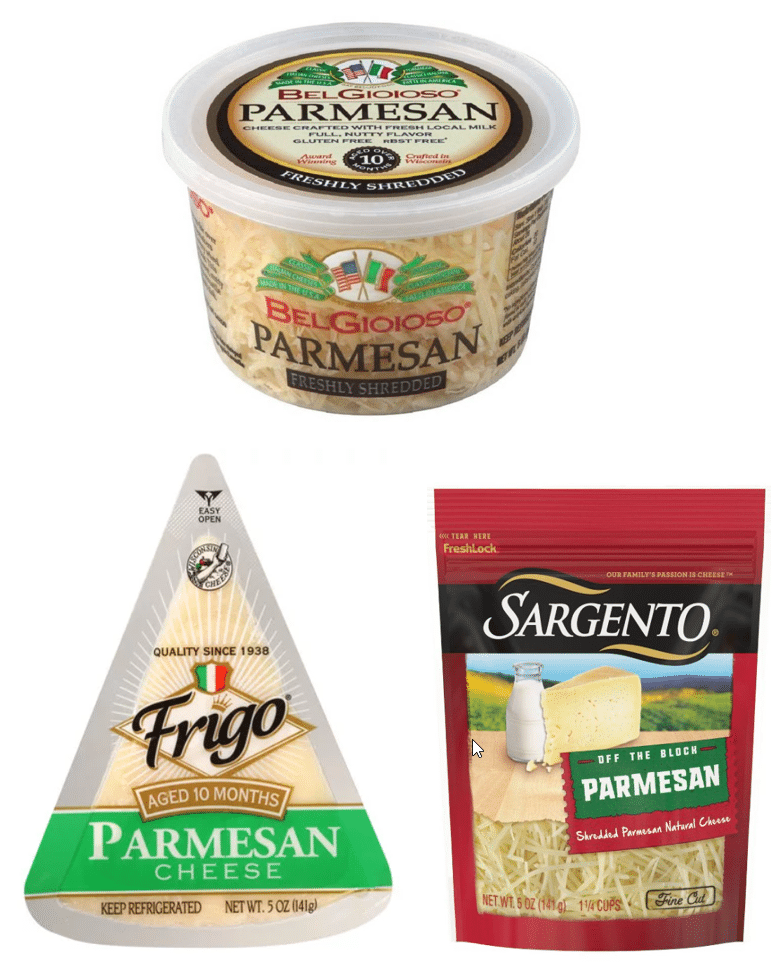
- Calories: 111
- Protein: 10g
- Carbohydrate: 1g
- Fat: 7g
- Sodium: 335mg
- Potassium: 26mg
- Calcium: 335mg
- Fiber: 0g
Is parmesan cheese high in protein?
Yes, parmesan cheese is considered a high protein food. Parmesan cheese is ~30% protein and contains approximately 10 grams of protein per one ounce serving.
Is parmesan cheese high in potassium?
No, parmesan cheese is considered a low potassium food. One ounce of parmesan cheese contains approximately 26mg of potassium.
Is parmesan cheese high in phosphorus?
Some type of parmesan cheese contain phosphorus additives (especially the kind you find that does not require refrigeration). Always check the ingredient list for ingredients that contain the letters “PHOS”, and avoid these if possible. One ounce of parmesan cheese contains 197mg of phosphorus, and the phosphorus found in animal based foods like cheese is only about 60-70% absorbable.
Is Mozzarella Cheese ok for kidney disease?
Mozzarella cheese can be an ok option for people with kidney disease, especially if they find a lower sodium mozzarella. One ounce of whole milk mozzarella contains:
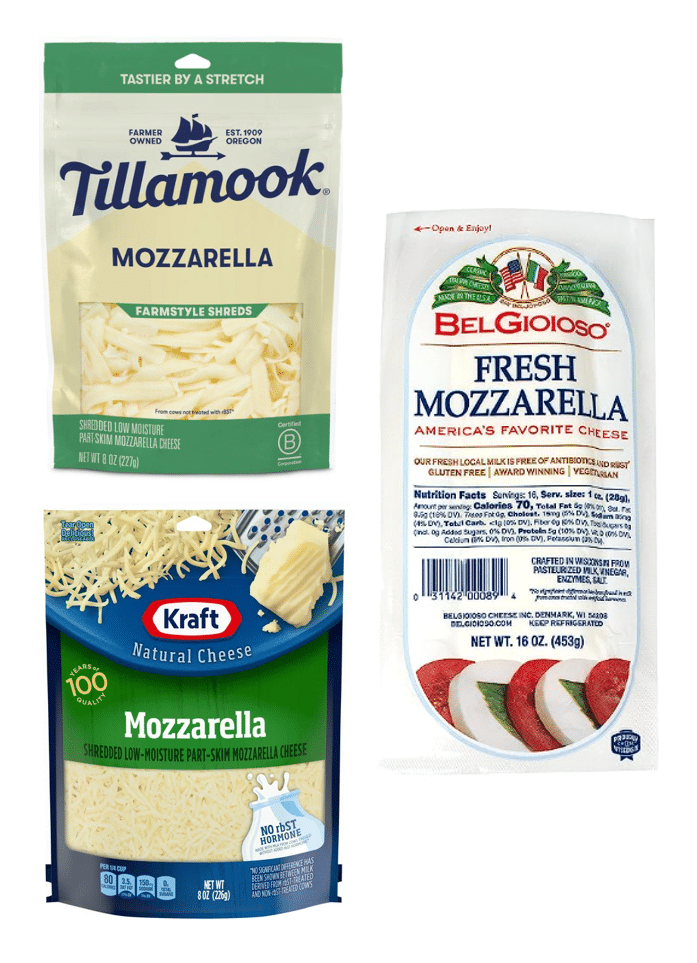
- Calories: 85
- Protein: 6g
- Carbohydrate: 1g
- Fat: 6g
- Sodium: 138mg
- Potassium: 22mg
- Calcium: 143mg
- Fiber: 0g
- Sugar: 0g
Is mozzarella cheese high in protein?
Yes, mozzarella cheese is considered a high protein food. One ounce of mozzarella contains 6g of protein.
Is mozzarella cheese high in potassium?
No, mozzarella cheese is considered a low potassium food. One ounce contains approximately 22 mg of potassium.
Is mozzarella cheese high in phosphorus?
Some mozzarella cheeses contain phosphorus additives, which would make them a high phosphorus food (for example, string cheese or vegan mozzarella). Real mozzarella cheese with no additives contains approximately 100mg of phosphorus , and the phosphorus found in animal based products like cheese is about 60-70% absorbable.
Is Cotija Cheese good for kidney disease?
Cotija cheese is 24% protein with 6g of protein per 100 calorie serving. While this is a higher protein (and high sodium) cheese, when used in moderation, it can be enjoyed on the CKD diet. For example, our Cotija Avocado Rice Pilaf includes a full serving of cotija cheese – and it’s delicious!
Is Blue Cheese good for kidney disease?
Blue cheese is about 25% protein and high in sodium. A great way to get the taste of blue cheese without too much protein is by using a blue cheese dressing, such as this Toby’s Blue Cheese Dressing. It only has 1 gram of protein per 140 calories and is just a little bit high in sodium with 180mg.
Is Brie Cheese good for kidney disease?
Brie cheese is 25% protein and higher in sodium. Many brie cheeses contain phosphorus additives, so if you choose to include Brie cheese in your meals, be sure to read the ingredient lists carefully!
